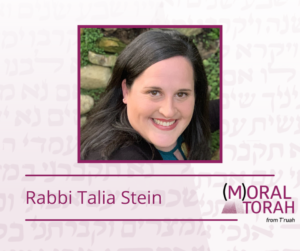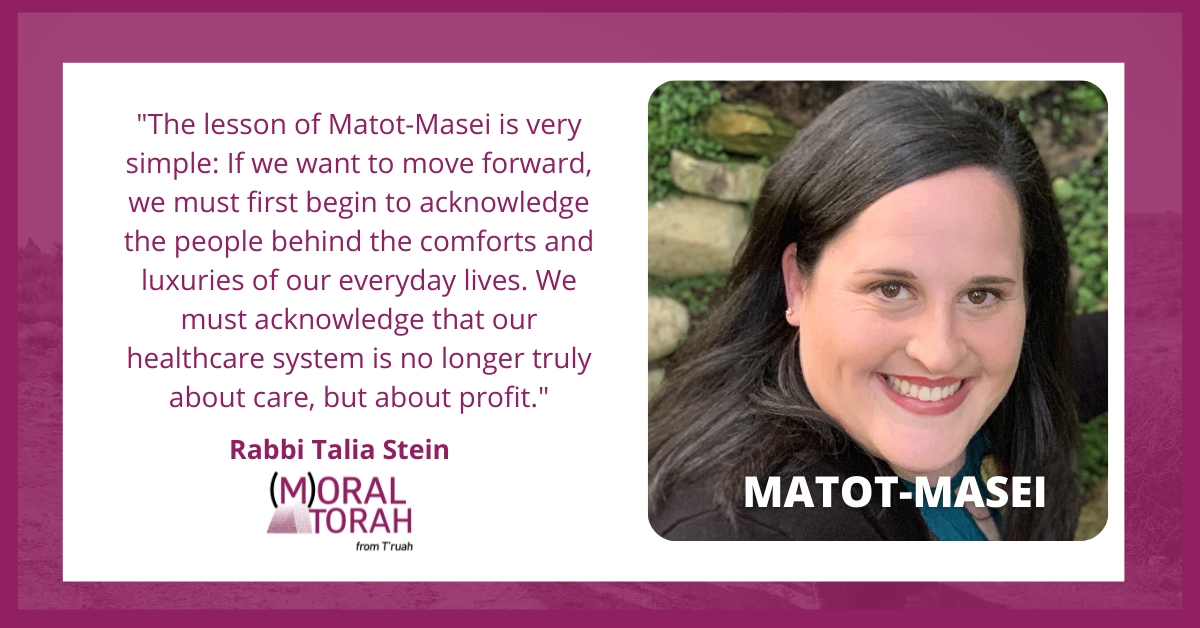A D’var Torah for Parshat Matot-Masei by Rabbi Talia Stein
In Parshat Matot, as the Israelites approach the land of Canaan, the tribes of Reuben and Gad realize that they would like to stay on the east side of the Jordan river, not part of the promised land. This seems like an innocuous request. The tribes can have more space by remaining on the east side of the Jordan and can let their many cattle graze freely. However, Moses is infuriated by this request. He picks up on something unsaid: “Are your brothers to go to war while you stay here?” (Numbers 32:6)
This parshah took me back to a conversation I had with a friend who is a social worker at a city hospital. She shared with me the heartbreaking story of an elderly woman who was clearly being neglected by her primary caretaker and had been in and out of the hospital several times over the last month. Her insurance was paying the caretaker, who was pocketing the money and not providing the food and medication the patient needed. The hospital wanted to free up a bed and discharge the woman back to her home. The insurance company concurred, as that was the cheapest option. My friend strongly recommended a rehab facility, where this woman would be under someone else’s care, but that was more expensive. The woman was sent home and, unsurprisingly, ended up back in the hospital only weeks later, in worse shape than she was before.
Sign up to receive (M)oral Torah in your inbox each week.
As she was sharing this story, my blood boiled. How could it be that we live in a society that so clearly prioritizes money over human life and where bureaucratic systems grind on, not seeing the individual people they allegedly serve? Neither the insurance company nor the hospital was willing to spend just a little more money to ensure her safety and wellbeing. Why was it that my friend had to look this woman in the eye and tell her that money was more important to the insurance company, to the hospital, than her own wellbeing?
On the surface, it doesn’t appear that the tribes of Reuben and Gad are asking for anything too troubling – they want to live their lush life, and enjoy their bounty, without having to go through the hardships of conquering the land. However, upon closer examination, we can see echoes of valuing their possessions above human life. In fact, the word used to describe cattle in the text is mikneh, derived from the Hebrew root meaning “to acquire” (k-n-h). The word is used to hint to us what is really at stake for the tribes in this request: the desire to keep and grow their acquisitions, their cattle, their material possessions, not a regard for their fellows’ wellbeing.
The tribes of Reuben and Gad respond to Moses. “We will build here sheepfolds for our flocks and towns for our children.” (Numbers 32:16) We will go with the rest of the Israelites and fight alongside them, staying there until every tribe is settled. However, we will not claim any land and we will return to the east side of the Jordan River.
Find more commentaries on Parshat Matot-Masei.
Here again, our sages pick up on something troubling in their request. They mention their flocks of sheep before their children. Numbers Rabbah 22:9 expounds that Moses and God are not incensed by the request itself not to enter the promised land, but rather the reasoning for it. The fact that for the tribes of Reuben and Gad, their cattle, their material possessions, are more important to them than their own children, than their fellow Israelites. The Holy One said to them, “You loved your money more than [your] souls. By your lives, there is no blessing in this.”
Today, we seem to have not learned the lesson from Reuben and Gad; money and material possessions constantly govern our decision making.  We often pay little attention to the humans affected by these decisions, whether it is the people receiving medical care or the people picking the tomatoes we eat. The lesson of Matot-Masei is very simple: If we want to move forward, we must first begin to acknowledge the people behind the comforts and luxuries of our everyday lives. We must acknowledge that our healthcare system is no longer truly about care, but about profit. We must allow ourselves to identify with Moses here and become incensed and our blood to boil. And we must be willing to use our voices to say there is no blessing in the status quo. Rather, our work is to see, to lift up, to prioritize humanity.
We often pay little attention to the humans affected by these decisions, whether it is the people receiving medical care or the people picking the tomatoes we eat. The lesson of Matot-Masei is very simple: If we want to move forward, we must first begin to acknowledge the people behind the comforts and luxuries of our everyday lives. We must acknowledge that our healthcare system is no longer truly about care, but about profit. We must allow ourselves to identify with Moses here and become incensed and our blood to boil. And we must be willing to use our voices to say there is no blessing in the status quo. Rather, our work is to see, to lift up, to prioritize humanity.
Rabbi Talia Stein is the assistant rabbi at Temple Sinai in Brookline, MA. She is an alum of both T’ruah’s summer fellowship and T’ruah’s Israel fellowship.


